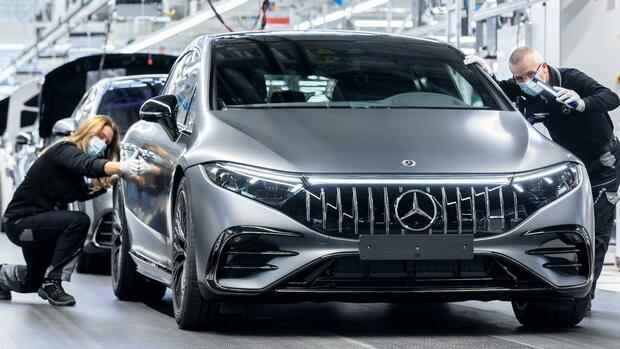The models of the manufacturers are getting bigger and more expensive.
(Photo: Daimler AG)
Munich In the end, empty phrases remain. BMW did “pioneering work” in setting up the car sharing platform, the car company announced on the day of the farewell. And at Mercedes, too, people “proudly” leave the field. But the future belongs to “the core business in the luxury segment”, and fast and cheap car rental in cities no longer fits.
Less than three years after the merger of mobility services, the car companies are getting out. Share Now, the heart of the Reach Now company, is sold to the Stellantis Group. It is a step that Mercedes boss Ola Källenius and BMW boss Oliver Zipse have wanted to take for a long time. They had never seen themselves as “mobility services”.
“Reach Now” was the last major project of their predecessors Dieter Zetsche and Harald Krüger. In February 2019, by merging their loss-making car-sharing fleets and taxi services, they thought they had to build a billion-dollar counterweight to Uber, the horror of the industry at the time.
Zipse and Källenius thought that was a mistake from the start – as soon as they were in office, they began to reverse the transaction. The announced sale of “Share Now” is now the final step in this turnaround.
Top jobs of the day
Find the best jobs now and
be notified by email.
Saying goodbye to the car sharing business is as consistent as it is risky. He is consistent, because to this day hardly any provider earns money with short-term car rentals. This is especially true for electric operation. A BMW manager once called car sharing with electric cars a “nightmare”. In addition to fleet operations, the car company also has to keep an eye on the charging infrastructure.
The joint project of the two former bosses of BMW and Daimler is now being reversed.
(Photo: Bloomberg)
The realization: you either do car sharing completely or not at all. However, Mercedes and BMW need their resources to build electric cars and introduce automated driving. The opponent is called Tesla and not Uber. Elon Musk threatens the business of the German premium manufacturers much more than that of the mobility providers with their limited ambitions.
The business model is called luxury
This also has to do with the pandemic: instead of sharing cars, many people want to own their own car again. And that tends to get bigger and more expensive. For years, weight, engine performance and thus the price of new cars have been increasing.
The car companies react and cancel the entry-level models. Mercedes is handing over the Smart to its Chinese partners, Audi is canceling the compact models A1 and Q2. BMW announces its luxury offensive: Giant SUVs like the X7 are now the profit drivers in Munich.
>> Read also: New 7 Series: BMW attacks the S-Class from Mercedes-Benz
But only a few people can afford such models. Offers under 50,000 euros list price can hardly be found among the German luxury brands. This also has to do with the scarce semiconductors that are saved for the expensive models. But that’s also strategy: the auto industry is building more and more products for an elite and fewer and fewer for the middle class. The masses are no longer served, but the wealthy.
BMW and Mercedes give up the claim to help shape cities
And that brings us to the risk. Because the companies’ car-sharing subsidiaries also had a strategic claim. They were image bearers. “Share Now” was digital and cool and brought Mercedes, BMW and Mini together with people who do not become customers through the assigned company car.
“Share Now” was also proof of the will to help shape cities and to be part of a solution and not part of the problem caused by increasing car traffic in and around our metropolises. “Share Now” was supposed to be more than the ignoble claim to debits and credits.
The billions in profits of the car companies and the future viability of their current business models do not go together. The resource requirements of car production, the space consumption of private transport and the energy hunger of heavy bodies are a heavy burden for future generations, even if the off-road vehicles of the future are electric. This path leads to a dead end.
The car managers are also aware of this. Ola Källenius has committed Mercedes to “Sustainable Modern Luxury”. At the last IAA, Oliver Zipse presented a completely recyclable electric car – small and compact. We are excited to see when these studies will become cars. Car sharing may be dispensable for the car companies. Sustainability and social responsibility are not.
More: Farewell to carsharing: Why BMW and Mercedes are selling Share Now to Stellantis
